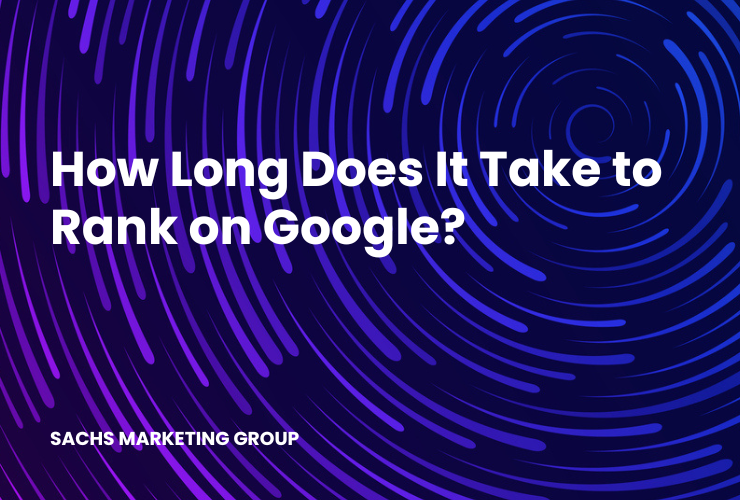Ranking on Google can range anywhere from a few minutes to 3-6 months or longer. The timeframe depends on website age, content quality, keyword competition, and SEO strategies. It’s not a one-size-fits-all scenario – each website’s journey to the top of Google’s rankings is unique.
How long does it take to rank on Google? It’s one of the most common questions relating to search engine optimization (SEO), and it’s always followed with a not-so-simple answer.
SEO isn’t an overnight success story – it requires patience, strategic planning, and ongoing effort.
This article explores how long it takes to rank on Google.

Overview
How Long Does It Take to Rank on Google?
The time it takes to rank on Google varies. It can be as quick as a few minutes for less competitive keywords and certain types of content, like news, or as long as several months for highly competitive keywords.
Studies that set out to reveal how long it takes to rank on Google reveal what we already know – longer content ranks for more keywords, pages with high-quality backlinks rank higher, faster websites perform better than slower websites, and so on. So, the question remains: how long does it take to rank on Google?
Most business owners are looking for a timeframe to set expectations. Unfortunately, this becomes difficult to answer because no two industries, websites, locations, or sets of target keywords are the same. This is why “it depends” is the most responsible answer.
With that said, we’re going to outline a loose approximation of what happens on average during some of the
Here’s a broad overview of how long it can take to rank on Google and see results:
<60 Minutes – Google’s Indexing API
For established websites using Google’s Indexing API, it’s possible to see rankings within the first 60 minutes after publishing an article.
While search engines still refer to sitemaps when crawling a website, using the API can help Google discover your new content less than a minute after publication. Once discovered, Google will evaluate the content and determine how to rank it against competing content in the index.
Using this process does not always result in the indexation of your content. Sometimes, indexing and ranking your content can take several days or weeks.
While Google recommends only using the API for certain types of content with a short shelf-life, like job postings or livestream videos, it’s possible to use this feature for other types of content.
This rapid indexing is more efficient than requesting a crawl via Google Search Console, offering a swift start in the SEO journey.
3 Hours – Enhanced Visibility
In just a few hours post-publication, a well-optimized article on an established website can achieve impressive early results, such as securing a featured snippet for the target keyword.
While not guaranteed, this quick win showcases the potential of well-researched and effectively optimized content to gain early visibility on Google.
Google uses featured snippets for certain queries, so expecting this for every page is unrealistic. The main takeaway is that achieving enhanced visibility in the search results within the first few hours of publishing your content is possible.
30 Days
In the first 30 days, business owners should anticipate minimal visibility for a new website on Google.
Early stages focus on indexing, where the goal is to ensure Google can find and understand the site. Rankings are typically unstable and low if they appear, especially for competitive keywords. Early success might be possible with niche, low-competition keywords, but substantial traffic from these is not expected.
This period is crucial for establishing solid SEO foundations: optimizing site structure, producing quality content, and basic on-page SEO. It’s also the time to start building domain authority through initial content and link-building efforts. Patience and strategic SEO are key.
Get started:
- The On-Page SEO Checklist for Busy Business Owners
- 10-Point Technical SEO Audit Checklist
- Check Your SEO Score
3-6 Months (New Website)
In the initial 3-6 months, a new website working with an SEO company may still be in the “Google Sandbox,” a phase where Google cautiously assesses new sites, potentially limiting visibility.
Despite professional SEO strategies, significant ranking improvements might be modest.
The focus is on building a robust foundation:
- Optimizing on-page elements
- Developing quality content
- Initiating internal and external link strategies.
Progress is gradual, as establishing domain authority and trust with search engines takes time. Incremental improvements in rankings, particularly for niche keywords, can be expected, but top rankings for competitive terms are unlikely during this early phase.
3-6 Months (Established Website)
An established website engaging an SEO company for the first time in the same period can expect a different trajectory.
Without the constraints of the Google Sandbox, improvements in rankings could be more apparent and quicker. The website already possesses some level of domain authority and credibility with Google.
The SEO efforts will enhance existing content, refine SEO tactics, and expand the site’s backlink profile.
Given the site’s established history, there’s potential for noticeable growth in search visibility, including for more competitive keywords, reflecting the advantage of having an already recognized presence on Google.
1 Year
Reaching the one-year mark, websites diligently practicing SEO can anticipate substantial advancements.
We’ve successfully helped websites achieve position 1 rankings for target keywords within the first year, but it’s not guaranteed, so it’s not something we promise. Again, it all depends on the industry, keyword, competition, and scope of the SEO campaign.
For example, we were able to help a client climb from position 10 to position 1 within the first year by increasing the resources available to the campaign. These resources allowed us to double the assets designed to support the website and achieve what would have normally taken two years in one year.
This period is particularly transformative for sites targeting competitive keywords in dense markets. Continuously updating content and refining SEO strategies throughout the year is crucial in cementing their position in search rankings.
By now, these websites have likely established domain authority and trust with search engines, making them more favorable in search results. A consistent focus on optimizing user experience, enhancing site speed, and building quality backlinks would have contributed to this growth.
This milestone is a testament to the effectiveness of persistent, well-planned SEO tactics in achieving long-term visibility and success online.
Related: 10 Benefits of Ongoing SEO Services
2 Years
After two years of dedicated SEO efforts, websites are expected to have secured solid keyword rankings.
This phase is crucial for reinforcing the site’s authority and widening its reach. With increased credibility, the focus shifts to targeting broader and more competitive keywords, leveraging the site’s established reputation in the digital space. This period often marks the transition from simply ranking to actively competing for top spots in search results, especially for high-value keywords.
Websites that have made it to the first page now face the challenge of climbing higher within those top results. Continuous optimization, advanced link-building strategies, and a deep understanding of user intent and behavior become key drivers for maintaining and improving these positions.
This stage signifies a move from foundational SEO towards more nuanced and competitive tactics, aiming for dominance in their respective niches.
3 Years
Three years into SEO, businesses can expect significant, stable results.
By this stage, a website should have established authority on Google, ranking well for various keywords, including the more competitive keywords that generate high levels of search volume every month.
This results in increased organic traffic and higher engagement. The SEO strategy will be refined and data-driven, effectively adapting to Google’s algorithm changes. There’s a likely increase in content quality and quantity, enhancing the site’s role as a niche authority. Additionally, the brand gains recognition and trust.
Overall, the website transitions from striving for visibility to maintaining and improving its established rankings, showcasing the long-term impact of dedicated SEO efforts.
3-5 Years and Beyond
Why “It Depends” Really is the Best Answer
The phrase “it depends” accurately captures the complexity of SEO and ranking on Google.
Each website’s path to ranking success is unique and influenced by numerous factors.
The competitiveness of keywords is a significant determinant – high-demand keywords take longer to rank for due to increased competition. Additionally, the age of a website matters – newer sites often take longer to establish authority and trust with Google.
Content quality and relevance are also crucial; well-researched, user-focused content tends to rank better. Technical aspects like website speed, mobile optimization, and user experience also play a significant role.
This multifaceted nature of SEO makes “it depends” the most realistic and honest answer.
Understanding Google’s Ranking Process
Google’s ranking process is intricate, revolving around numerous algorithms designed to deliver users the most relevant and quality content.
At its core, the process involves two primary steps: crawling and indexing. Crawling is where Google’s bots scan the web for content and visit web pages. Indexing is the next step, where this content is analyzed and stored in Google’s vast database.
When a user searches, Google’s algorithms sort through this database to present the best matches.
These algorithms consider content relevance, keyword usage, site authority, and user experience. The algorithms are continuously updated, aiming to improve the accuracy and relevance of search results. This means the criteria for ranking can change, requiring websites to stay adaptive and regularly update their SEO strategies.
Understanding this process is critical to mastering SEO and improving your website’s ranking on Google.
Factors Influencing How Long It Takes to Rank
Several key factors play a role in determining how long it takes for a website to rank on Google:
Age of the Website:
- Older sites with established authority typically rank faster.
- Newer websites may take longer to gain traction.
Keyword Competition:
- High-demand keywords with more competition take longer to rank.
- Niche or long-tail keywords often have quicker ranking possibilities.
Quality and Relevance of Content:
- Content that addresses user queries effectively is favored.
- Google prioritizes high-quality, valuable content.
Quality of Backlinks:
- Backlinks from reputable and relevant sites can enhance ranking speed.
- The overall backlink profile impacts the site’s trustworthiness.
Technical Aspects:
- Website speed: Faster sites tend to rank quicker.
- Mobile optimization: Crucial for ranking in mobile searches.
- User-friendly design: Enhances user experience and ranking potential.
These factors collectively influence the timeframe for a website’s ranking improvements.
The Ethical Approach to SEO Promises
Adopting an ethical approach to SEO means prioritizing honesty and transparency in all SEO-related promises and strategies.
This approach is crucial in a field rife with unrealistic guarantees, like the promise to help your website rank #1 in 90 days. Ethical SEO professionals avoid exaggerating claims about quick rankings and instead set realistic expectations.
They focus on sustainable, long-term results rather than short-lived successes achieved through dubious means. This ethical stance extends to the methods used – adhering strictly to Google’s guidelines, focusing on creating high-quality, relevant content, and building organic backlinks.
Such practices safeguard a website’s reputation and ensure its resilience against future algorithm updates. Ultimately, the ethical approach is about building trust – with both the search engines and the clients, ensuring a foundation for lasting success in the ever-evolving landscape of digital marketing.
Leveraging Insights for Effective SEO
Effective SEO is significantly enhanced by leveraging data and insights. This process involves a deep dive into analytics to understand user behavior, search patterns, and the performance of existing content.
By analyzing this data, SEO professionals can identify what works and what doesn’t, allowing for more targeted and effective strategies.
For instance, user engagement insights can reveal the content types that resonate most with the audience, guiding content creation efforts.
Keyword performance analysis helps refine keyword strategies, ensuring that efforts focus on terms that drive traffic and conversions. Additionally, competitive analysis offers a view into what competitors are doing right, providing opportunities to learn and adapt successful tactics.
Leveraging these insights leads to more informed decisions, helping to optimize websites in a way that aligns with both search engine algorithms and user preferences, thereby enhancing the effectiveness of SEO efforts.
Working with a Professional SEO
The challenge of navigating the ever-changing landscape of search engine optimization can be daunting for many businesses.
This is where the expertise of a professional SEO comes into play, offering a solution to this complex issue. Working with a professional SEO expert is crucial to establishing, increasing, and defending your website’s rankings.
Here are three main benefits:
- Tailored Strategies for Different Stages: A professional SEO can develop unique strategies that cater to each stage – establishing a new presence, increasing existing rankings, or defending against competitors. This ensures that the approach is always aligned with your website’s current needs and objectives.
- In-Depth Analysis and Adaptability: SEO experts conduct thorough site audits and market analysis, allowing for a deep understanding of your site’s performance and the competitive landscape. This insight enables them to adapt strategies quickly in response to search engine algorithm changes or shifts in market trends, keeping your site ahead of the curve.
- Sustainable and Ethical Practices: Professionals in SEO prioritize sustainable, white-hat techniques that build and protect your site’s reputation over time. This approach improves rankings and defends them against potential penalties from search engines, ensuring long-term success.
The result is a significant improvement in search rankings and web traffic, culminating in a stronger online presence. Investing in professional SEO expertise is not just about fixing current challenges –it’s about setting the stage for continued digital success.
Need Help with Your SEO?
Are you struggling to make your website visible on Google? With our expert SEO services, Sachs Marketing Group is here to turn that around.
As a full-service digital marketing agency, we specialize in crafting tailored SEO strategies that drive results.
Imagine seeing your site climb the search rankings, drawing more traffic and converting visitors into customers.
With our comprehensive approach and experienced team, we make this a reality for businesses like yours. Contact Sachs Marketing Group today to learn how we can help you with your SEO.
Frequently Asked Questions
Here are a few frequently asked questions relating to how long it takes to rank on Google:
How long does SEO take?
SEO typically takes 3 to 6 months to start showing results. This timeframe can vary based on website age, competition, and content quality. SEO is a long-term strategy that requires ongoing effort and adaptability to the evolving digital landscape.
How long does local SEO take?
Local SEO usually starts showing results within 3 to 6 months. Success depends on factors like the competitiveness of the local market, the quality of local listings, and the effectiveness of your overall local SEO strategy. Check out our 10 SEO tips for local business visibility.
How long does it take to rank on Google?
Ranking on Google can vary widely, generally taking anywhere from a few minutes for low-competition keywords to several months or more for competitive terms. Factors like website authority, content quality, and keyword competition play a significant role.
How long does it take for SEO to work?
SEO generally starts to work within 3 to 6 months. This period is needed for search engines to crawl and index new content and for SEO strategies to impact the site’s visibility and ranking.
How long does SEO take to show results?
SEO typically takes about 3 to 6 months to show tangible results. This timeframe can be influenced by various factors, such as the website’s current state, competition, and the implementation of effective SEO strategies.
How can you rank for a keyword fast?
Focus on less competitive, long-tail keywords to rank quickly for a keyword. Ensure your content is high-quality, relevant, and optimized for these keywords. Also, leverage internal linking and acquire high-quality backlinks. However, it’s important to maintain realistic expectations as SEO results typically take time.
Conclusion
In the dynamic world of SEO, understanding the intricacies of ranking on Google is key to digital success.
While the journey to the top of search results can vary widely, it’s clear that a strategic, ethical approach combined with patience and continuous effort is essential. For those seeking professional guidance, partnering with experienced agencies like Sachs Marketing Group can be a game-changer, providing the expertise and insights needed to navigate the SEO landscape effectively.
Embracing SEO as a long-term strategy paves the way for sustainable growth and a robust online presence, crucial for thriving in today’s digital marketplace.
2 Comments
Leave a Reply
Contact us today to get the conversation started!












It’s essential to understand that ranking on Google depends on many factors, and the time it takes can vary greatly. There’s no one-size-fits-all answer. It can take weeks or even months to see significant results. Google considers factors like content quality, keyword relevance, backlinks, domain authority, and user experience, among others. Simply focusing on a keyword isn’t enough—you need a comprehensive SEO strategy that includes technical optimization, high-quality content, and active engagement with your audience. It’s important to set realistic expectations and focus on delivering genuine value to users. Saying there’s a specific timeframe for ranking could be misleading.
Great insights, and I couldn’t agree more! Thanks for sharing, Ronald.